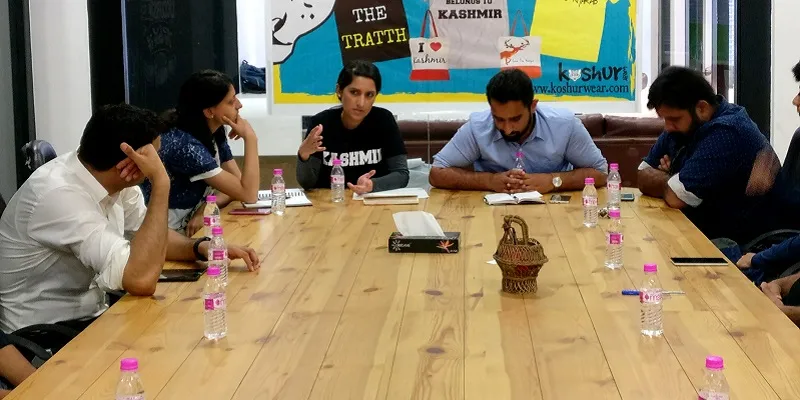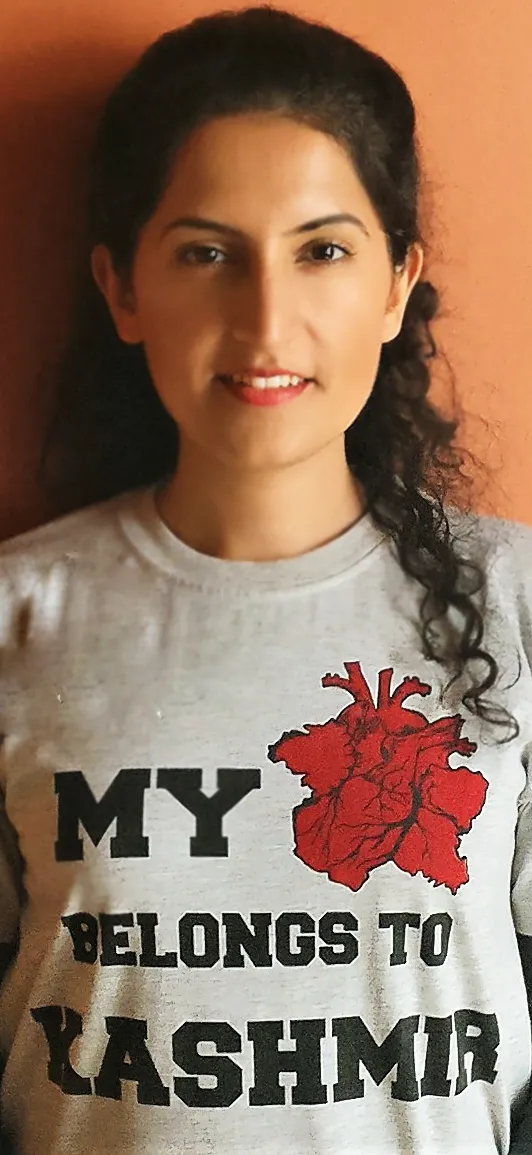How a 29-year-old Kashmiri woman is using a quirky brand to promote Koshur culture
‘I love NY’ tees are ubiquitous at T-shirt stalls, but Anantnag-based Sama Beg wanted to see similar T-shirts that celebrated Kashmiri culture. She launched Koshur Wear, a bootstrapped, online only brand that sells contemporary clothing and accessories.
For most of her life, 29-year-old Sama Beg has lived outside Kashmir. Raised in the Middle East, she went to the US for her education. But a part of her always wanted to return to Kashmir and give back something.
The path was clear to her after an incident that took place when she was visiting her home town, Anantnag, in 2012.
Sama was driving along KP Road in Anantnag when she chanced upon a young Kashmiri boy wearing a T-shirt that said “I love NY”. Normally, it was something she wouldn’t have noticed, but that day it stood out.
Explaining the dilemma she felt, Sama says, “It bothered me. Having lived in the US, I had never once seen someone show off an ‘I love Kashmir’ shirt. Being a proud Kashmiri, I wondered why no products that promoted Kashmir and Kashmiri culture existed. I decided to change this and that was when the idea behind Koshur Wear was born.”
After two years of research, Sama moved back to Kashmir.

Building the brand
Koshur Wear is an online only brand that offers contemporary clothing and accessories that let people show off their Kashmiri pride. The platform currently offers T-shirts and tote bags with social messaging. Products are currently only available through their website; the brand is also present on Facebook and Instagram as Koshur Wear.
Sama says the mission is to enable Kashmiris to express themselves while promoting graphic design and supporting social causes.
Customers can place an order directly on the website and choose to use 'cash on delivery' or 'pay using an online payment' option. They currently offer two products for customers in North America.

“Since 2012, when Koshur Wear was just in my imagination, the idea has evolved significantly. After I moved home in 2015 from the US, I finally had the chance to dedicate time to work on Koshur Wear, hash out the concept and develop the business model. Along with my best friend and some creative family members, we established the brand’s identity, products and future goals,” Sama says.
Originally the concept only had patriotic products. Koshur Wear soon decided to include items with a humorous angle, keeping in mind Kashmir’s uniquely hilarious phrases. The startup also aims to promote art and graphic design, a fact that’s rooted in Sama’s personal experiences.
She says, “One of my cousins was a talented artist. Because comic books and board games were difficult to come by in Kashmir in the 1990s, he would make his own at home by recycling cardboard and other items. But he didn’t receive support from his family to pursue art and eventually had to give up on his passion. At Koshur Wear, we invite talented artists and graphic designers from Kashmir to join our team. We hope to provide them a platform to showcase their talent to the world so they don’t have to give up on their passion.”
Setting up the processes
The first order of business was developing products. For that she brought in her childhood friend and graphic designer Mustaali Raj, who helped develop the logo and designs. Sama also was able to rope in popular Kashmiri cartoonist Mir Suhail to develop some of their first designs.
After developing the products, they decided to do a soft launch at the 2017 Kashmiri Gathering of North America. The team launched with just two products there – their Koshur Heart T-shirt and the signature Kalle Kharab T-shirt. This was a trial and helped the team gauge the response and get feedback from customers.
“We launched in Kashmir on May 19, 2017, at ThinkPod, in Srinagar. Because we feel passionate about promoting art, we invited talented artists from two non-profits – CHINAR Kashmir and the Kashmir Education Initiative – to participate in the event and learn about cultural entrepreneurship from a leading artist of Kashmir,” she says.
Their T-shirt designs now include “My Heart Belongs to Kashmir”, “Kashmir”, “What The Tratth” and “Kalle Kharab”.
“Our tote bag designs include ‘I love Kashmir’ and ‘Save The Hangul’. A portion of the purchase of the ‘My Heart Belongs to Kashmir’ T-shirt goes towards supporting the Skills Enhancement and Entrepreneurship Development program at Child Nurture and Relief (CHINAR) Kashmir, a non-profit that works toward rehabilitating orphans,” Sama says.
A portion of the money raised by the sale of the Save The Hangul tote bags will be donated to organisations that work to save the Kashmiri Hangul.
Currently, the products are manufactured in Delhi, while the head office is located in Anantnag, Kashmir. Graphics on all products have been designed by Kashmiri artists.
Working with the challenges
Like any startup, Koshur Wear faced several issues. Quality is something they didn’t want to compromise on but identifying a vendor who they could trust and could deliver on quality in their time frame was tricky.
Since this was the first time Sama’s was working in South Asia, she had to get used to a work culture where, sadly, transparency and professionalism are not common.

“This was challenging but something that we were able to overcome with patience and determination. Also, because we are currently only available online, anytime the internet is blocked by the government in Kashmir it hits our business,” Sama says.
To top that, being a woman in a conservative society and launching a brand that has a sense of humour came with its own challenges. Sama says,
There were individuals who did not think it was a good idea to embark on such a venture and thought it would not be successful. However, I persevered and gradually they realised I wasn’t going to stop, and they gave up on telling me otherwise.
Currently bootstrapped, Koshur Wear is purely run by family and friends at the moment. Sama’s nephew, Qazi Saaib, manages logistics in Srinagar; her best friend, Adah Shair, manages social media and also handles operations in North America.
Catering to a niche market
The push for taking the Indian artisan business global is becoming big. There already is Jos&Fine, another Kashmiri startup that aims to revive Pashmina in Kashmir.
Another company that works in the same vein, but in Jaipur, is Jaipur Rugs, which employs several thousand artisans and also sells to international markets. Apart from this, there also is a growing demand for niche online marketplaces.
Etsy, a US-based online platform for handcrafted goods that is the inspiration behind the Indian alternative marketplaces, is a listed entity, with a market cap of almost $1.5 billion.
While the customer base may be big, getting them online is the challenge as these marketplaces are still only getting the word out. Unlike their larger peers, these platforms do not discount and do not do mass marketing. Brand and marketing expert Meeta Malhotra says their “niche-ness” can be an advantage in marketing. In the years to come, Sama hopes to add more products to the product line and open a few offline stores.







